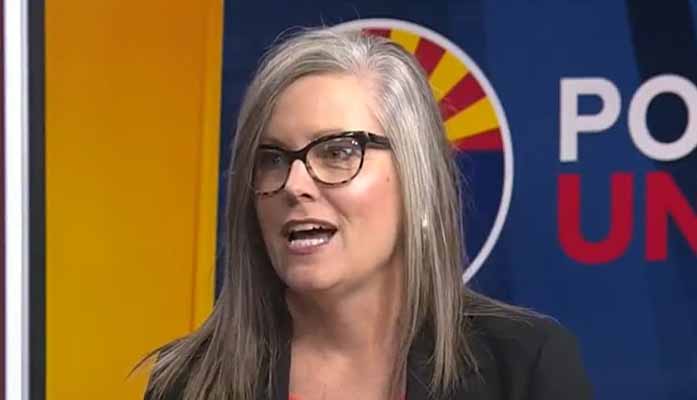
by Staff Reporter | Jan 22, 2026 | News
By Staff Reporter |
Voters may soon get to decide whether or not photo radar will continue to be used in the state.
A committee in the State Senate approved the bill on Tuesday.
SCR 1004 would ban photo enforcement systems used to identify violators of speed restrictions or traffic control devices from the entire state.
If approved by the state legislature, the measure could appear on the ballot as early as this November. Lawmakers opted for a resolution as a more viable pathway to bypass the requirement for Governor Katie Hobbs’ approval.
The governor didn’t support attempts to ban photo radar in the past.
Last year, the governor vetoed the same legislative language (outlined in a bill rather than a resolution) after its party-line approval in the legislature. No Democrats in either the House or Senate voted for the bill. Hobbs’ veto letter argued that the removal of photo radar would make the roads more dangerous, not safer.
“This bill attempts to remove the ability of local law enforcement to keep our streets safe by eliminating a tool used to enhance roadway safety,” stated Hobbs.
This sentiment was shared by Democratic lawmakers. State Sen. Lauren Kuby argued that certain studies supported the effectiveness of photo enforcement systems to reduce and deter traffic violations.
During voting on the bill last year, some Republicans — Reps. Teresa Martinez, Justin Wilmeth, Alexander Kolodin — did express doubts about the strategy of advancing a bill with SB 1019 rather than a resolution. An identical measure existed in SCR 1002.
Wilmeth said they were “wasting” their time by voting on the bill version of the legislation rather than the resolution.
“I want my Republican caucus members to understand: this bill will pass, and it will get vetoed,” said Wilmeth. “This is what majorities are about, and in this issue we are wasting our opportunity.”
Kolodin said Democrats were defending photo radar under false pretenses of public safety concerns, and that their true intentions had to do with ticket revenues’ ties to clean election campaign funds.
“The photo radar scam is the way that our friends across the aisle fund their war machine. They run candidates in noncompetitive districts and funnel taxpayer money over to competitive districts, all on the backs of hardworking Arizona drivers who are denied due process when they receive their traffic tickets,” said Kolodin. “It’s almost as if we’re more interested in making a show of solving the problem than actually solving the problem.”
State Sen. Wendy Rogers authored both pieces of legislation last year and was the lawmaker to reintroduce it again this year.
Rogers disputed Hobbs’ veto claim in a press release published on Tuesday. The state senator stressed the unreliability of automated enforcement, which is what photo radars operate under. Rogers said it should be law enforcement, not technology, to make the judgment call on violations of traffic law.
“Automated enforcement removes discretion, undermines due process, and turns routine driving into a revenue stream,” said Senator Rogers. “That’s not how law enforcement should work in Arizona. The resolution does not excuse dangerous driving or eliminate traffic enforcement. It ensures that enforcement decisions are made by trained law enforcement officers, not algorithms and contractors.”
AZ Free News is your #1 source for Arizona news and politics. You can send us news tips using this link.

by Staff Reporter | Jan 21, 2026 | Education, News
By Staff Reporter |
Governor Katie Hobbs claimed the state’s school choice program lacks oversight.
The Arizona Department of Education (ADE) and experts dispute Hobbs’ claim.
The governor targeted the Empowerment Scholarship Account (ESA) Program during her state of the state speech last week. Hobbs advocated for the school choice program to be rolled back from universalization to its previous form that only accepted certain families with disability or military backgrounds.
“While other government entitlements have strict requirements and oversight, the ESA program continues to operate unchecked, squandering taxpayer dollars with no accountability,” said Hobbs. “It seems like every day, we learn about new shopping sprees happening at the expense of taxpayers…diamond jewelry, high-end clothing and furniture…who knows what taxpayers will be footing the bill for tomorrow?”
ADE publishes notice of its internal audits and has attempted to refer cases over to the attorney general’s office for prosecution — though Attorney General Kris Mayes has reportedly been unwilling to pursue prosecution of alleged fraud or abuse.
ADE bases its claims on existing requirements within the ESA Program: documenting all purchases made, and freezing accounts that make unauthorized expenditures. Parents must repay the program for unauthorized purchases.
In August, ADE reported it marked over $600,000 for collections “due to possible fraud or misuse.”
That’s less than one-tenth of one percent of total ESA spending, as noted by the Heritage Foundation in a report last August.
Comparatively, the estimated total fraud within average federal government obligations ranges from three to seven percent, according to a 2024 report by the Government Accountability Office.
Other examples of improper payment rates within government programs in Arizona have been issued recently. (The latest data aligns with the 2024 fiscal year in most cases).
The Department of Labor announced an estimated seven percent improper payment rate from July 2021 to July 2024.
For the 2024 fiscal year, the USDA reported that Arizona had a payment error rate of nearly nine percent.
The federal government even factors in improper payment rates to mitigate losses.
The Center for Medicaid projected an improper payment rate of over six percent for Arizona in 2024.
This indicates that fraud is an inevitable occurrence within any government program.
Unlike the reporting efforts of ADE regarding the ESA Program, the Arizona Auditor General presently finds that nearly 30 school districts are noncompliant based on financially related internal control deficiencies.
This slate of presently noncompliant districts represents over $1 billion in state spending. The entire ESA program spent under $900 million in the 2025 fiscal year and costs about $1 billion for the 2026 fiscal year.
Arizona school districts have accumulated nearly $8 billion in cash reserves, per the Heritage Foundation’s assessment of Arizona Superintendent Tom Horne’s annual report covering the 2023-2024 fiscal year.
Horne responded to Hobbs’ state of the state address with criticism over the governor’s open opposition to a program supported by a majority of voters. Arizona voters approved universalization of school choice back in 2022.
“Arizona parents have made it clear they believe in being able to choose the best education for their children, whether districts, charters or Empowerment Scholarship Accounts,” said Horne. “By their loud display today, Democrats proved they want to take that power away from mothers and fathers who know their children’s needs best and return education to a government monopoly that parents do not want.”
AZ Free News is your #1 source for Arizona news and politics. You can send us news tips using this link.

by Staff Reporter | Jan 20, 2026 | News
By Staff Reporter |
Arizona cities reported increased murder rates that outpaced declines, per preliminary crime statistics.
The following cities reported murder rate increases per the Real-Time Crime Index, whose data goes through October: Gilbert (600 percent), Scottsdale (400 percent), Yuma (300 percent), Peoria (300 percent), Chandler (100 percent), Mesa (33 percent), and Tempe (25 percent).
The Real-Time Crime Index, which collects crime data from over 500 law enforcement agencies across the nation, comes from AH Datalytics.
Other cities reported decreases in murders: Buckeye (100 percent), Casa Grande (100 percent), Flagstaff (100 percent), Marana (100 percent), Prescott Valley (100 percent), Avondale (66 percent), Peoria (55 percent), Glendale (43 percent), Phoenix (24 percent), and Tucson (22 percent).
Pima, Pinal, and Yavapai Counties all reported decreases in crime (55, 100, and 100 percent, respectively).
This occurred despite the predictions of 2025 crime to have dropped to the lowest levels since 1960. The cause behind the disparity remains unknown. One theory speculates underreporting by major cities; another speculates actions by the current administration to address rising crime.
AH Datalytics’ cofounder, Jeff Asher, said in an interview with ABC News that even conservative estimates of the preliminary data reflect the largest one-year drop in crime statistic recordkeeping dating back to 1960. Prior to cofounding the company, Asher was a crime analyst for the CIA.
Asher clarified that a major influence on the significant crime drop manifested in major cities notorious for their high levels of violent crime. Some of these cities are anticipated to have crime rates better than those seen over 60 years ago — some by over 80 years, said Asher.
“You’ve got places like Detroit, Philadelphia and Baltimore that are on track to have the fewest murders since the 1960s. New Orleans, in spite of the terrorist attack on January 1, is on pace to have the fewest murders since 1970,” said Asher. “San Francisco is on track to see the fewest number of murders since 1940.”
The preliminary review across the nation reflected a 20 percent decrease in murders, eight percent decrease in aggravated assault, and over 20 percent decrease in car theft.
The findings confirm early analysis published in July by the Council on Criminal Justice. These analyses are only preliminary estimates — the FBI hasn’t yet released its official annual crime report.
Some have attributed the decline to actions taken by President Donald Trump, but crime rates have been dropping since 2022.
2024 reflected a 15 percent decline in murders; 2023 reflected a 13 percent decrease; and 2022 reflected a six percent decrease.
It wasn’t until this past June that Trump began deploying National Guard troops and other federal forces into major cities. Trump first directed troops to Los Angeles, California, followed by Washington, D.C. in August, then Memphis, Tennessee in October.
Those sorts of actions have come to an end, for now. Trump responded this week to a Supreme Court ruling from last week with an announcement that he would no longer deploy the National Guard to major cities. Specifically, he ordered troops pulled back from Chicago, Illinois; Los Angeles, California; and Portland, Oregon.
The president also had his eye on New York, San Francisco and Oakland in California, and Baltimore, Maryland.
AZ Free News is your #1 source for Arizona news and politics. You can send us news tips using this link.

by Staff Reporter | Jan 20, 2026 | Economy, News
By Staff Reporter |
The Republican faction of Congress’ Joint Economic Committee (JEC) reported inflation as “hold[ing] steady” in its monthly update released last week.
JEC Republicans reported in a press release accompanying the update that the Consumer Price Index (CPI) “remained relatively steady” at just under 2.7 percent year over year in December.
The coalition stated that November’s end CPI (2.74 percent) represented “the biggest [inflation] drop” since March 2025.
Food and energy prices went up by half a percent to almost three percent from 2024 to 2025, respectively; the latter by far outpacing the former.
Food price inflation hit 3.07 percent, up .56 percent year over year. Energy price inflation hit 2.30 percent, up by 2.82 percent year over year.
These price increases were felt differently based on region. Those in the Northeast were hit hardest by inflation (3.3 percent), then the West (2.9 percent), and then the Midwest (2.7 percent). The South felt it the least of all the regions, with inflation hitting 2.2 percent.
Income year over year overall saw increases: an increase in 1.07 percent for all employees and a .57 percent increase in weekly earnings. There was a “virtually unchanged” decline in hourly earnings of .01 percent.
President Donald Trump broke down this latest report as part of his address on the state of the economy in Detroit last Tuesday.
Trump said the U.S. has experienced “the greatest year in history” in terms of its finances.
“Under our administration, growth is exploding, productivity is soaring, investment is booming, incomes are rising, inflation is defeated. America is respected again like never before,” said Trump. “There’s never been numbers like this.”
Trump said the stagflation (low growth, high inflation) that took place under his predecessor, Joe Biden, was “a disaster” for the country. Trump claimed the current economy has “the highest growth” it’s ever had.
“The Trump economic boom has officially begun,” said Trump.
The president said he would work with Venezuela on oil, and aims to reduce gas prices beyond its current six-year low.
Trump called Federal Reserve Chairman Jerome Powell “a real stiff.” He expressed a desire to have a high-performing market matched with lower interest rates, not higher — he said the former arrangement was the norm years ago.
“Our growth potential is unlimited and could be much higher if we went back to sanity,” said Trump. “We announce good numbers and we see the stock market drop. And I say ‘What the hell is going on?’”
Trump said he secured commitments for over $18 trillion in new investments into the country, compared to Biden’s under $1 trillion secured in four years.
A White House press release following Trump’s remarks maintained that the latest inflation report came in below economists’ expectations. Their statement compared Trump’s core inflation (2.4 percent) as “much lower” than former President Joe Biden’s 3.3 percent annual rate.
Their summary also emphasized that wages are “rising” on track to four percent: an estimated $1,100 real wage gain among private sector workers, and $1,300 real annual earnings gain among goods-producing workers.
AZ Free News is your #1 source for Arizona news and politics. You can send us news tips using this link.

by Staff Reporter | Jan 19, 2026 | News
By Staff Reporter |
A Phoenix-based progressive lobbyist organization is being accused of involvement in an “illegal” political campaign against two Democratic state lawmakers.
The campaign, “Hernandon’t,” is allegedly the handiwork of at least one lobbyist with Creosote Partners. Hernandon’t seeks to prevent the reelection of Democratic state representatives Alma Hernandez and Consuelo Hernandez this November.
The campaign accuses the Hernandez sisters of being “far-right Democrats” who align more with President Donald Trump than the Democratic Party. Specific grievances include the sisters’ votes or sponsorships of bills banning police budget cuts, enabling institutionalization of the homeless, prohibiting antisemitism in public schools, banning unauthorized encampments at public universities, and requiring age verification for online access to pornography.
The campaign is also seeking viable candidates to run against the Hernandez sisters.
The Hernandont’s website doesn’t disclose who is behind the campaign. Rather, a disclosure at the bottom of the website says, “Hernandon’t is sponsored by an individual and not by any political committee.”
Arizona law requires disclosures under certain circumstances on political advertisements:
“A person that makes an expenditure for an advertisement or fundraising solicitation, other than an individual, shall include […] disclosures in the advertisement[.]”
Statute defines advertisements as any “information or materials, other than nonpaid social media messages, that are mailed, emailed, posted, distributed, published, displayed, delivered, broadcasted, or placed in a communication medium and that are for the purposes of influencing an election.”
Earlier this week, Rep. Alma Hernandez posted on X that a sign from the Hernandon’t campaign was placed in her neighborhood, and that it lacked the “paid for by” disclosure. Hernandez accused those behind Hernandon’t of breaking the law.
Hernandez specifically accused one of the Creosote Partners, Hugo Polanco, of being behind Hernandon’t after he appeared in the House Judiciary Committee on Wednesday with a Hernandon’t sticker on his laptop. Hernandez is a member of the House Judiciary Committee. She asked Hugo whether the sticker on his laptop was related to the campaign, and he confirmed it was.
“Clearly showing his direct involvement is a new level of stupid,” said Hernandez.
Later that day on the House floor, Hernandez made a public statement accusing Polanco of “deeply troubling, inappropriate, creepy, and unacceptable” behavior. Hernandez also put Creosote Partners on notice.
“To all lobbyists, I’m not here to be your friend. I’m here to work,” said Hernandez. “I don’t work for you. I work for my district who has elected me for the last eight years.”
Hugo was present at the House Judiciary Committee to deliver testimony on House Bill 2108 as a representative of Rural Arizona Action. Chairman Quang Nguyen interrupted Hugo twice for failing to speak to the bill.
Hugo strayed from the bill when he attempted to discuss the case of the Minnesota woman fatally shot after driving into an ICE agent, Renee Good. Nguyen advised Hugo that the Good incident was federal in nature.
Later, Rural Arizona Action cited Nguyen’s two corrections as part of their claim that Nguyen “cut off” Hugo mid-testimony. Hugo was allowed to finish his testimony, per the committee video.
Polanco’s coworkers at Creosote Partners are familiar with independent efforts to make and distribute campaign materials.
Jeanne Woodbury, transgender activist and fellow lobbyist at Creosote Partners, designed and posted campaign signs against Proposition 138 in 2024.
The campaign signs read “No on Prop 138, we can do the f*****g math.” Woodbury told the Arizona Agenda and the Arizona Republic in separate interviews that he put them next to campaign signs in favor of Proposition 138.
Woodbury claimed to the Arizona Republic that he wasn’t required to put a funding disclosure on his signs because he paid for them himself as an individual.
AZ Free News is your #1 source for Arizona news and politics. You can send us news tips using this link.





